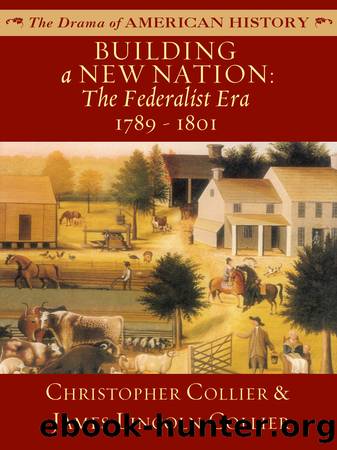Building a New Nation: The Federalist Era: 1789 - 1801 by James Lincoln Collier

Author:James Lincoln Collier
Language: eng
Format: epub
Publisher: AudioGO
Published: 1999-09-15T00:00:00+00:00
Left, the twentieth-century version of the ribbonsâcampaign buttons in support of Al Smith in the 1928 election, Harry Truman (1948), and Adlai Stevenson (1956).
People like Washington, Hamilton, and their supporters believed as much as anyone in the rights of Americans; many of them had, after all, helped to write the Constitution and the Bill of Rights, which set forth those rights. (For the story of the creation of the Constitution and the Bill of Rights, see Creating the Constitution, the sixth book of this series.) But Washington, Hamilton, and their allies were believers in strong government. This belief in strong government was based in part on their idea that the common people did not have the patience or expertise to solve the kinds of knotty problems any government faces. Surprisingly, a good many ordinary people agreed. America was still to some extent what historians call a "deferential" society. Ordinary people were not going to let their leaders trample on their hard-won rights; nonetheless, they believed they ought to show respect for richer, often better-educated people of the upper class, and they were more willing to take direction from them than would be the case today.
It therefore seemed natural to many people, especially among the wealthy, that some were meant to lead and some were meant to follow. Ordinary people, so this thinking went, did not have enough education and experience of the world to make wise decisions in large matters of public policy. Once people had elected their government, they ought to do what it said without grumbling. If citizens didn't like the policies of their government, they could chose a new one when the next elections came around.
George Washington was one who followed this line of thinking. In his Farewell Address he said that it is "the duty of every individual to obey the established government." He even believed that the people should not form "combinations and associations"âwhat we would today call pressure groupsâto push government in various ways.
Washington's right-hand man, Secretary of the Treasury Alexander Hamilton, was an even more devout believer in strong government. As we have seen, he felt it was in the best interests of the United States for the wealthy merchants, manufacturers, exporters, and importers not merely to have a free hand to enrich themselves further, but actually to receive various kinds of government support. In doing business, so Hamilton thought, these merchants would bring prosperity to everybody elseâjobs for sailors and fishermen, markets for farmers with corn and hogs to sell.
Hamilton and Washington were not alone in holding these opinions. They had the support of many Americans, both small farmers and leading figures like Vice President John Adams; the first chief justice, John Jay; Attorney General Edmund Randolph. Taken together, these leaders believed in strong central government, fairly weak state governments, a deferential populace, and policies that would suit the interests of merchants, shippers, big plantation owners. Indeed, they had a certain fondness for the formalities and ceremonies that had always existed around the British monarch and his court.
Download
This site does not store any files on its server. We only index and link to content provided by other sites. Please contact the content providers to delete copyright contents if any and email us, we'll remove relevant links or contents immediately.
Pale Blue Dot by Carl Sagan(5007)
Cracking the GRE Premium Edition with 6 Practice Tests, 2015 (Graduate School Test Preparation) by Princeton Review(4293)
Pocahontas by Joseph Bruchac(4259)
Unfiltered by Lily Collins(4004)
The Emotionary: A Dictionary of Words That Don't Exist for Feelings That Do by Eden Sher(3363)
The Daily Stoic by Holiday Ryan & Hanselman Stephen(3317)
The 48 laws of power by Robert Greene & Joost Elffers(3291)
Factfulness_Ten Reasons We're Wrong About the World_and Why Things Are Better Than You Think by Hans Rosling(3237)
The Innovators: How a Group of Hackers, Geniuses, and Geeks Created the Digital Revolution by Walter Isaacson(3206)
The President Has Been Shot!": The Assassination of John F. Kennedy by Swanson James L(3101)
Sapiens and Homo Deus by Yuval Noah Harari(3071)
Rogue Trader by Leeson Nick(3043)
Gettysburg by Iain C. Martin(2834)
The Rape Of Nanking by Iris Chang(2823)
Almost Adulting by Arden Rose(2709)
The Plant Paradox by Dr. Steven R. Gundry M.D(2620)
In the Woods by Tana French(2598)
500 Must-Know AP Microeconomics/Macroeconomics Questions(2572)
Make by Mike Westerfield(2321)
